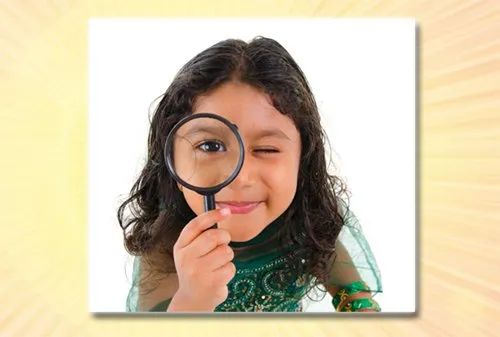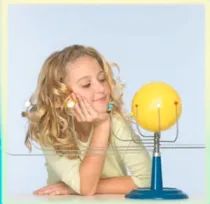FAQ: I’ve heard that Montessori schools don’t have textbooks, homework, or even grades. Can this be true?
It is true that Montessori classrooms do not emphasize the use of textbooks, grades, or homework. This is because Montessori students are encouraged to take ownership of their own learning. This is an essential step in fostering the child’s natural, in-borne desire to soak up knowledge. Why take this approach, you ask? Because children who are internally motivated are far more likely to become responsible, self-disciplined, confident, initiative-takers, with strong academic skills and a lifelong love for learning. This is the key to education as it should be: developed to teach the way children really learn.
Textbook Troubles
 The Montessori method teaches children how to find information for themselves.
The Montessori method teaches children how to find information for themselves.

Textbooks do not fit into this design because they can be limiting. When children are taught to rely on textbooks for answers, they will not know how to find information once you take that textbook away. For example, it is standard practice to have children fill out worksheets that follow the exact order of the information in the textbook. Often, the answers are even highlighted in bold text or italicized. This simply teaches children to copy what they see in front of them. It does not teach children how to find information for themselves. The Montessori approach uses hands-on lessons, movement, object manipulation, information-gathering, and many other ways to teach children how to think, process, and learn independently, a lesson that will serve them well for a lifetime.
“We must help the child to act for himself, will for himself, think for himself; this is the art of those who aspire to serve the spirit.” ~ Maria Montessori
Another limitation with textbooks is that everyone in the class is expected to be on the same path and proceeding at the same rate. Maria Montessori knew that children learn at different paces and have different interests at any given time. Children experience many sensitive periods during their development. During a sensitive period, children are receptive to specific information and will have specific interests as a result. The Montessori approach taps into these sensitive periods and maximizes the child’s learning experience. Children are able to access the right information, at the right time in their development.
Homework Hitches
Homework is another rarity for the Montessori student. Maria Montessori teaches us not to mandate the work of the child at school, or at home.
“We cannot know the consequences of suppressing a child's spontaneity when he is just beginning to be active. We may even suffocate life itself. That humanity which is revealed in all its’ intellectual splendor during the sweet and tender age of childhood should be respected with a kind of religious veneration. It is like the sun which appears at dawn or a flower just beginning to bloom. Education cannot be effective unless it helps a child to open up himself to life.” ~Maria Montessori
 Practical life activities such as helping to set the table or folding laundry can develop math and/or language skills, increase dexterity, and increase confidence.
Practical life activities such as helping to set the table or folding laundry can develop math and/or language skills, increase dexterity, and increase confidence.

Parents are encouraged to continue with the idea of following the child’s lead at home. This is not to say you shouldn’t have rules or boundaries at home, or that you should allow children to do whatever they please. But parents can provide a safe and discovery-rich environment that encourages the child’s natural interests. Therefore, the child may voluntarily choose to continue his or her “work” at home.
Keep in mind that there are many everyday household activities that can represent homework. Practical life activities such as helping to set the table or folding laundry can develop math and/or language skills, increase dexterity, and increase confidence. Reading with children every day is another language-boosting activity that doubles as a pleasant way to interact and relax with family.
Gradebook Griefs
Instead of focusing on grades, Montessorians focus on “mastery.” In Montessori classrooms, children work toward the complete and thorough understanding of a concept.
“A child who has become master of his acts through long, pleasant and interesting activities in which he has engaged, is a child filled with health and joy and remarkable for his calmness and discipline. " ~Maria Montessori

This is quite different than memorizing what you need to pass a test. To illustrate the difference, let me ask you this: how many times have you crammed for an exam, passed it with a good grade, and then forgotten the whole concept soon afterwards? Most of us have memorized material to pass that class and move on. But how different would it have been if you had actually gained life-enriching knowledge for your time and efforts? And imagine this: what if you had actually enjoyed the learning process and wanted to learn more? This is the difference between a GPA-focused education and a Montessori education.
In short, Montessori students learn more comprehensively, more joyfully, and more naturally through the Montessori method, and they do it without a bunch of textbooks, homework, or grades. Would you like to learn more about the Montessori Method? We welcome you to visit Age of Montessori’s information-rich website, watch our powerful webinars (free and professional development,) join our discussions on blogs and Facebook, and participate in our many online courses.





















